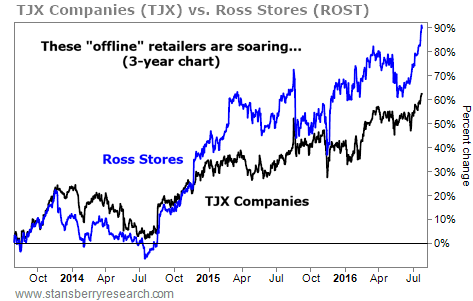| Home | About Us | Resources | Archive | Free Reports | Market Window |
The Japanese Yen Is on the Verge of a Major FallBy
Thursday, July 28, 2016
The Japanese yen just had its worst week in years...
Seriously... the yen fell 4.1% two weeks ago, its worst one-week fall since 2009.
That alone is a rare event. But there's something even rarer about this big decline.
The computers behind our high-priced True Wealth Systems service helped spot this anomaly. And based on history, it will lead to even greater losses in the yen, starting now.
Let me explain...
A 4%-plus weekly fall is rare for a major currency. In the case of the yen, we've seen one-week losses of 4% or more only 11 times going all the way back to 1971.
That means these large one-week declines happen less than once every four years, on average. But there's something even rarer in this case...
Again, this isn't something most folks would notice... even folks who track the currency markets closely. But our True Wealth Systems computers helped spot it...
You see, most of the yen's large one-week declines came while it was already in a downtrend. But this month's major loss came after the yen had been making new highs.
Specifically, the yen hit a 52-week high at the beginning of July... and then fell 4% in a week starting just a few days later. That situation has only happened four other times since 1971... making it incredibly rare.
Importantly, these were not good times to bet on a higher yen. All four occasions led to losses over the next year... and major underperformance versus the typical return for the yen. Take a look...
A 5.1% loss might not seem large... But remember, this is a currency. Currencies tend to move glacially compared with other markets. Even so, this shows a total underperformance of nearly 8% versus the typical one-year return for the yen. That's huge for a currency.
What is happening here is simple: The yen was in an uptrend. It was making new 52-week highs. But then it suffered a terrible weekly return. And history says this usually signals the end of a major move higher.
Is a new downtrend beginning? We can't know for sure. But history shows that betting on a higher yen today is a bad idea.
The smart money says the yen will likely fall even further over the next year.
Good investing,
Brett Eversole
Further Reading:
The yen may weaken from here, but Steve is becoming bullish on Japan's stock market right now. "Japan's investment prospects haven't been on my radar this year," he writes. "But with these near-perfect setup conditions, they are now." Read more here.
Elsewhere in Asia, one group of stocks is paying a higher dividend yield than their price-to-earnings ratio. "It's almost against the laws of nature," Steve writes. Get the story here.
Market NotesNOT ALL 'OFFLINE' RETAILERS ARE STRUGGLING... One of the biggest stories in financial media over the past few years has been the long, slow death of "offline" retail. Today's chart challenges that idea...
Many traditional retailers – such as JC Penney (JCP) and Macy's (M) – have seen their earnings and share prices take major hits over the past few years. Meanwhile, online retailers like Amazon (AMZN) continue to enjoy the boom in e-commerce. Financial pundits would have you believe that offline retail is going the way of the dinosaur. But not all offline retailers are struggling...
Two offline retailers bucking this trend are TJX Companies (TJX) and Ross Stores (ROST). TJX owns retail stores Marshalls and T.J. Maxx. These retailers buy off excess inventory from traditional retail stores for pennies on the dollar and sell them to consumers for a discount.
As you can see in the chart below, being offline hasn't hurt business. Shares of Ross have nearly doubled in three years... while TJX shares are up about 60%. Folks are still shopping offline... They're just not paying full price.
 |
Recent Articles
|



